Sneha Dharwadkar
Ph.D. student, Oklahoma State University, USA, 2021-.
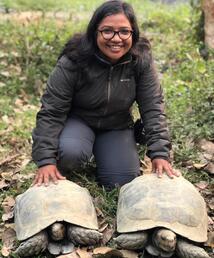
I am a PhD student in Dr. Guin Wogan’s lab in the department of Integrative Biology at the Oklahoma State University. I am a herpetologist from India and have worked in different parts of the country on herpetofaunal studies, especially on turtle conservation, and various conservation education projects. For my PhD thesis, I am interested in looking at the phylogenomics of the softshell turtles of Nilssonia spp and phylogeography of Leith’s softshell turtle (Nilssonia leithii) across different riverine ecosystems of India.
Freshwater turtles and tortoises fascinate me due to their natural history, diversity in body size, ecological adaptations, morphology and cultural significance. Moreover they are highly threatened and are often exploited via illegal trade. I wanted to work towards conservation and spread awareness about these neglected animals and thus I co-founded Freshwater Turtles and Tortoises of India (FTTI). I am also a member of IUCN Tortoise and Freshwater Turtle Specialist Group (TFTSG). I am an avid birder and I occasionally paint, some of which surprisingly turn out good! For a sneak peek into my work, check out my instagram and twitter.
Freshwater turtles and tortoises fascinate me due to their natural history, diversity in body size, ecological adaptations, morphology and cultural significance. Moreover they are highly threatened and are often exploited via illegal trade. I wanted to work towards conservation and spread awareness about these neglected animals and thus I co-founded Freshwater Turtles and Tortoises of India (FTTI). I am also a member of IUCN Tortoise and Freshwater Turtle Specialist Group (TFTSG). I am an avid birder and I occasionally paint, some of which surprisingly turn out good! For a sneak peek into my work, check out my instagram and twitter.
Milena Bors
Ph.D. student, Warsaw University of Life Sciences, Poland, 2021-.
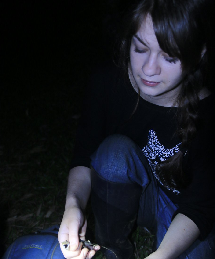
I am a PhD student affiliated to the Department of Animal Genetics and Conservation, Institute of Animal Sciences, Warsaw University of Life Sciences. I first came to India to study sleeping ecology of Monilesaurus rouxii for my Masters’ thesis. This experience allowed me to aspire to fulfill my life goal, which is research on crocodilians. Everything about these animals has fascinated me for as long as I can remember, from their peculiar taxonomy to their social behaviour. I am working with Kartik and a dedicated field team on a molecular genetic study of mugger crocodiles Crocodylus palustris in India towards risk mitigation, reintroduction and ecological corridors.
In my free time, I am either climbing or trekking. I enjoy consuming various forms of artistic expression, be it books, comic books, movies or video games. My favourite artistic movement is turpism.
In my free time, I am either climbing or trekking. I enjoy consuming various forms of artistic expression, be it books, comic books, movies or video games. My favourite artistic movement is turpism.
Meenakshi Poti
Ph.D. student, Vrije Universiteit, Belgium, 2019-.
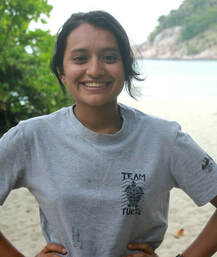
With interests in social ecology, my work focuses on understanding complex relationships between people and nature. I am enthused by island systems because they encapsulate deeply rooted and strongly linked social ecological interactions. For my PhD, I study conflicts between conservation and development in small islands. Much of my research is focused in the Andaman Islands. I am affiliated to the Université Libre de Bruxelles (ULB) and Vrije Universiteit Brussel (VUB) - Belgium and Dakshin Foundation - India.
I completed my Masters with the Erasmus Mundus Joint Master Degree in Tropical Biodiversity and Ecosystems (TROPIMUNDO), conducted in Belgium, Italy and Malaysia. I am passionate about creative science communication and the role of youth in decision making. Before starting my PhD, I worked as a trainee at the European Commission’s Environment department, where I initiated the EU Youth for Biodiversity program, to provide a platform for the youth, at international environmental negotiations. Through my project 'Storytelling through brushstrokes', I use art and creative writing to communicate science and policy to a wider audience.
I completed my Masters with the Erasmus Mundus Joint Master Degree in Tropical Biodiversity and Ecosystems (TROPIMUNDO), conducted in Belgium, Italy and Malaysia. I am passionate about creative science communication and the role of youth in decision making. Before starting my PhD, I worked as a trainee at the European Commission’s Environment department, where I initiated the EU Youth for Biodiversity program, to provide a platform for the youth, at international environmental negotiations. Through my project 'Storytelling through brushstrokes', I use art and creative writing to communicate science and policy to a wider audience.
P. Gowri Shankar
Ph.D. student, North Orissa University
A study on population genetics of King Cobra, Ophiophagus hannah (Cantor, 1836: Serpentes: Elaphidae) across Peninsular India, 2023.
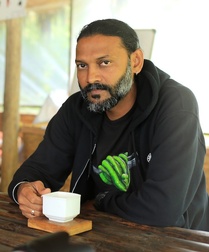
Snakes, especially king cobras have been a passion for as long as I can recall. As a field biologist, I have been studying their natural history both in captivity and in wild for close to two decades. I am currently enrolled as a PhD candidate at the North Orissa University and an affiliate student at Centre for Ecological Sciences, IISc, India. I was part of a student exchange programme at Uppsala University, Sweden (ERASMUS-MUNDUS EMINITE Program-2014-2016)
I am currently examining range-wide phylogeography and contemporary population genetic structure of the king cobra within India and reconstructing the biogeographic history of O. hannah in Southeast Asia. We will test for the presence of evolutionary distinct units (ESU’s) and underlying drivers, for the long-term conservation of king cobras. We plan to use a sampling design that incorporates the geographical and bioclimatic heterogeneity of the Indian subcontinent to collect king cobra samples (non-invasive) and occurrence data across the extant range of the species.
I am currently examining range-wide phylogeography and contemporary population genetic structure of the king cobra within India and reconstructing the biogeographic history of O. hannah in Southeast Asia. We will test for the presence of evolutionary distinct units (ESU’s) and underlying drivers, for the long-term conservation of king cobras. We plan to use a sampling design that incorporates the geographical and bioclimatic heterogeneity of the Indian subcontinent to collect king cobra samples (non-invasive) and occurrence data across the extant range of the species.
Ashwini V. Mohan
Ph.D., Technische Universitat Braunschweig, Germany.
Diversification on Islands: insights from macro and micro-evolution of Phelsuma day geckos in the Indian Ocean, 2021.
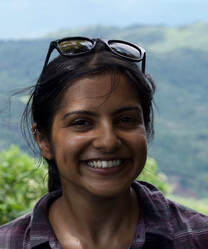
I completed my Masters’ dissertation studying phylogeographic patterns in island populations of the Andaman keelback snake (Xenochrophis tytleri). I then went back to the A&N Islands to study geckos, focussing on their distribution, genetic diversity and population structure. My interests are population genetics of terrestrial island fauna, biogeography and evolutionary mechanisms that create and maintain diversity. I am currently a PhD student at the Vences lab, TU Braunschweig, Germany. My PhD focuses on macroevolutionary patterns, ecological niche and diversification within island lineages of the genus Phelsuma.
Website: ashwinivmohan.weebly.com
Website: ashwinivmohan.weebly.com
Vidyadhar Atkore
Ph.D., Ashoka Trust for Research in Ecology and the Environment, Bangalore, India.
Drivers of fish diversity and turnover across multiple spatial scales: Implications for conservation in the Western Ghats, India, 2018.
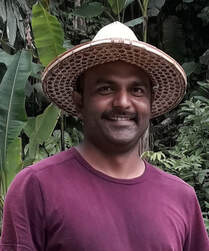
Besides rainforests, freshwater ecosystems fascinate me the most. As a freshwater biologist, I am interested in understanding patterns and processes that influence the organization of fish communities at different scales. My PhD was conducted in the four sub-basins of Bhadra, Tunga, Malaprabha (Karnataka) and Mhadei (Goa). I sampled fishes using non-destructive traditional methods of cast nets (with different mesh size). My results suggested that fish diversity was driven by stream size while at the stream segment level it was determined by habitat type, disturbance level and water chemistry variables My study highlights the importance of free-flowing (undammed rivers) and role of water chemistry variables in maintaining high fish diversity in the central Western Ghats of India.
Subsequently, I conducted Post-doctoral research at ATREE on the impact of hydropower projects on native fish communities and key reproductive guilds in Ranganadi river sub-basin, Arunachal Pradesh. Currently, I am an Aquatic Ecologist at WWF-India, Bangalore office in the ‘River Wetlands and Water Policy’ Division.
Subsequently, I conducted Post-doctoral research at ATREE on the impact of hydropower projects on native fish communities and key reproductive guilds in Ranganadi river sub-basin, Arunachal Pradesh. Currently, I am an Aquatic Ecologist at WWF-India, Bangalore office in the ‘River Wetlands and Water Policy’ Division.
Aniruddha Marathe
Ph.D., Ashoka Trust for Research in Ecology and the Environment, Bangalore, India.
Species richness and distribution of ants (Hymenoptera: Formicidae) along an elevational gradient in the Eaglenest Wildlife Sanctuary (Arunachal Pradesh, India), 2018.
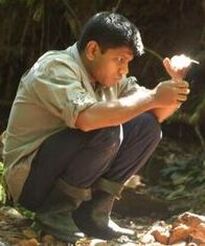
I am interested in geographic gradients in biodiversity and mechanisms that generate these gradients. I am happiest when studying biodiversity patterns of ants, but frogs, trees and birds are also exciting. I followed my first interest during PhD at ATREE and Manipal University, where I worked on ant communities across elevation gradients in the Eastern Himalaya.
This work involved a systematic sampling of ants from the Eaglenest Wildlife Sanctuary. We observed a spectacular decrease in species richness, from 83 species at 600m to only six species at 2400m. We also explored drivers for other properties of communities like beta diversity, species composition and species range extents. Environmental changes broadly determine patterns across elevation but biological properties such as body size, prey specialization, and social life history strategy of ants, also play a role . Overall, the results suggest that effect of decreased ecological opportunity towards higher elevation is driving the patterns.
This work involved a systematic sampling of ants from the Eaglenest Wildlife Sanctuary. We observed a spectacular decrease in species richness, from 83 species at 600m to only six species at 2400m. We also explored drivers for other properties of communities like beta diversity, species composition and species range extents. Environmental changes broadly determine patterns across elevation but biological properties such as body size, prey specialization, and social life history strategy of ants, also play a role . Overall, the results suggest that effect of decreased ecological opportunity towards higher elevation is driving the patterns.
Madhuri Ramesh
Ph.D., Ashoka Trust for Research in Ecology and the Environment, Bangalore, India.
Conservation amidst development in a nonequilibrium environment: a study of marine turtles in Odisha, India. 2018.

The conservation of olive ridley turtles (Lepidochelys olivacea) began about three decades ago in India - it is one of the first such large-scale programmes in the country and has a long history of power struggles associated with it. My doctoral dissertation focused on how protectionism (a form of conservation governance which focuses on the spatial separation of wildlife from humans) gets framed, practiced and sustained with respect to a mobile species, that too in a densely inhabited landscape.
I continue to be interested in political ecology: much of my research and applied work deals with how power shapes nature-society relations. I am particularly interested in understanding the tensions between conservation and development in coastal and island areas. I am currently a faculty member in the School of Development, Azim Premji University.
I continue to be interested in political ecology: much of my research and applied work deals with how power shapes nature-society relations. I am particularly interested in understanding the tensions between conservation and development in coastal and island areas. I am currently a faculty member in the School of Development, Azim Premji University.
Nibedita Mukherjee
Ph.D., Vrije Universiteit and Université Libre de Bruxelles, Belgium.
Mangrove Ecosystem Values and Functions, 2014.
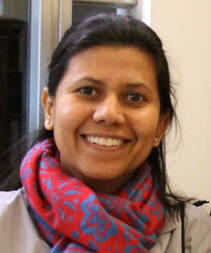
I undertook an interdisciplinary dual PhD on mangroves and I conducted fieldwork on the latitudinal limits of mangroves and (USA and South Africa) and in Sri Lanka. Subsequently, I did a post doc at the University of Cambridge where I collaborated with 10 large international conservation organisations e.g. UNEP-WCMC, Birdlife, IUCN, RSPB, FFI among others. I led diverse expert groups to review top 100 questions of global conservation significance and barriers to evidence use in conservation policy. I drew evidence from the literature in diverse fields such as behavioural economics, experimental economics and social psychology.
Over the years, I have worked on a global range of ecological change applications such as ecosystem services, business–biodiversity linkages, natural disaster mitigation, wolf–dog hybridization, global mangrove fisheries, sustainable development goals, impact assessment, conservation genetics and indigenous ecological knowledge in the Arctic. I am currently a lead author on the methodological assessment of values of nature produced by the Intergovernmental Panel on Biodiversity and Ecosystem Services.
Over the years, I have worked on a global range of ecological change applications such as ecosystem services, business–biodiversity linkages, natural disaster mitigation, wolf–dog hybridization, global mangrove fisheries, sustainable development goals, impact assessment, conservation genetics and indigenous ecological knowledge in the Arctic. I am currently a lead author on the methodological assessment of values of nature produced by the Intergovernmental Panel on Biodiversity and Ecosystem Services.
Katrina Fernandez
Ph.D., University of Tasmania, Australia.
Invertebrate and mammal biodiversity on some sadas (ferricretes) of the Western Ghats, India, 2012.
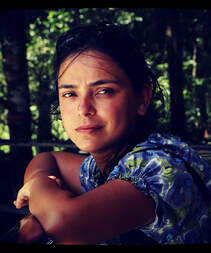
My PhD aimed to quantify the invertebrate biodiversity and test the assumptions that invertebrates on the Sada are distinct assemblages from that of the surrounding forest habitat type. My results indicated that seasonality in climate, especially precipitation, is a large scale driving force providing conducive habitats for numerous opportunistic and generalist species to migrate onto the sada from the adjoining forest habitats.
Today, I run Wild Otters Research Pvt Ltd, a wildlife entrepreneurship aiming at creating a sustainable business model for conservation. I am interested in various aspects of conservation biology, including community ecology, population dynamics and population viability of meso mammals. I also have a strong interest in communicating conservation issues and science to the public and engaging people in participatory approaches to conservation, including rewilding, wildlife monitoring, and awareness raising. I have experience working as an ecologist in Africa, Asia and Australia and I am a member of the IUCN/SSC Otter Specialist Group.
Today, I run Wild Otters Research Pvt Ltd, a wildlife entrepreneurship aiming at creating a sustainable business model for conservation. I am interested in various aspects of conservation biology, including community ecology, population dynamics and population viability of meso mammals. I also have a strong interest in communicating conservation issues and science to the public and engaging people in participatory approaches to conservation, including rewilding, wildlife monitoring, and awareness raising. I have experience working as an ecologist in Africa, Asia and Australia and I am a member of the IUCN/SSC Otter Specialist Group.
